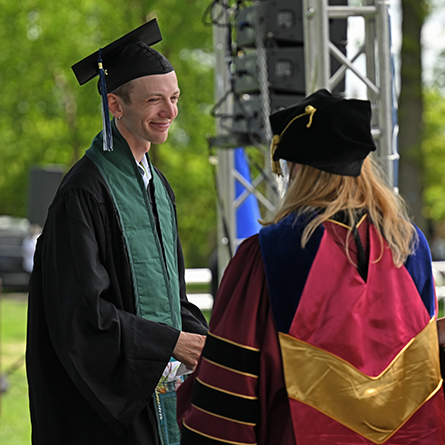
Skyler Kardell ’25 wins the 2025 Claire Gaudiani ’66 Prize
Skyler Kardell ’25, an environmental studies and architectural studies double major and scholar in the Goodwin-Niering Center for the Environment from Nantucket, Massachusetts, was awarded the 2025 Claire Gaudiani ’66 Prize for his honors thesis and senior integrative project, “Vagrancy and Exploration: A Summary of the Literature and Conceptualization of an Ongoing Paradigm Shift Within Ornithology, Citizen Science and Philosophy of Evolution as It Relates to the Marginal Distributions of Birds,” at Connecticut College’s 107th Commencement on May 18.
Named for Connecticut College’s eighth president, the Claire Gaudiani ’66 Prize for Excellence in the Senior Integrative Project is awarded annually to the student with the best senior integrative project in one of the College’s interdisciplinary centers.
Blending ornithology, philosophy of science, evolutionary theory, conservation biology and literary history, Kardell’s work is a sustained critique of the concept of “vagrant” birds, or birds found far outside of their usual ranges. Kardell challenges the conventional view that when a bird is found in an area far from its usual habitat or migratory path, something must be wrong—that the vagrancy is an aberration that must result either from external conditions that overwhelm the animal or else an internal malfunction that leads it to fly the “wrong” way. Instead, Kardell makes a compelling case that these are normal birds at the leading edge of population dispersal. He suggests that instead of thinking of birds as vagrant, they should be considered peripatetic—moving around all the time with migratory paths that are not as fixed and straightforward as commonly assumed.
“Skyler’s thesis is an audacious argument for revising scientific concepts,” Derek D. Turner, Class of 1943 Professor of Philosophy and Karla Heurich Harrison ’28 Director of the Goodwin-Niering Center for the Environment, wrote in a letter nominating Kardell, his advisee, for the Gaudiani Prize.
“His ideas about evolution are creative and transformative, and his reframing of high risk/high payoff dispersal behaviors is highly relevant to understanding speciation in the Anthropocene. We cannot begin to wrap our minds around the current biodiversity crisis unless we can understand how human activities might be affecting speciation rates and patterns, and dispersal behavior is central to understanding how speciation works in birds.”

